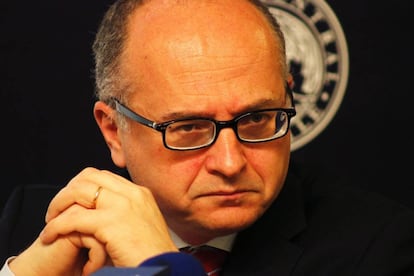After bitter breakaway a decade ago, Argentina returns to the IMF fold
Delegation from the international organization is in Buenos Aires to review new president’s reforms

Argentina is trying rebuild its relationship with the International Monetary Fund (IMF), 10 years after the governments of Néstor Kirchner and Cristina Fernández de Kirchner broke away from the global organization. An IMF delegation led by Italian Roberto Cardarelli has arrived in Buenos Aires for a 10-day mission that will evaluate recent economic reforms carried out by President Mauricio Macri. If the delegation’s report is favorable, as the Argentinean government expects, this visit will be a step forward on Argentina’s road back to orthodox economic policies and will open the flow of international investment, which dried up under kirchnerismo. Though the IMF remains a controversial entity at home, President Macri is seeking to reestablish ties with the organization in order to attract foreign investment.

The mere mention of the name of the IMF in Argentina, as in most of Latin America, is practically anathema. Millions of people in the region blame the IMF and its policies for the disastrous 1990s, a lost decade for many Latin American nations. In Argentina, the bank’s neoliberal recipes and the Carlos Menem presidency (1989-1999) share the responsibility for the 2001 economic crisis, the worst in Argentinean history. Fifty percent of the nation fell below the poverty line in what was once the richest country in South America and one of the top world powers of the 20th century. But those days are gone and the IMF is not what it used to be. Leaders of the global organization have acknowledged past mistakes, and Argentina wants to rebuild the relationship.
Kirchner renegotiated the country’s debt and paid nearly all its creditors, except the so-called “vulture funds”
The South American country also declared the largest default in the history of the planet, and the Kirchners, who rose to power after the 2001 crisis, never re-established a normal relationship with the IMF. President Cristina Fernández de Kirchner renegotiated the country’s debt and paid nearly all of its creditors except the so-called “vulture funds,” investors with whom Macri has finally reached an agreement.
Argentina rejected IMF loans and survived thanks to exports of raw materials and foodstuffs such as soy. Relations between the IMF and Argentina finally reached their boiling point in 2007 when, fed up with rising inflation numbers from the then-respected National Institute of Statistics and Census (INDEC), the administration intervened and stocked the organization with political appointees who would deliver the rates the government needed. Inflation dropped but the group lost all credibility, and IMF leaders said they no longer trusted the organization’s calculations.
Relations between the IMF and Argentina finally reached their boiling point in 2007
Rebuilding faith in INDEC has been one of the first and main initiatives of the Macri administration. The president appointed Jorge Todesca, a respected economist, as director. Todesca decided to not publish any statistics for six months while he reorganized the group. Its first calculations, which have not been disputed by any reputed organization, painted a grim picture for the government. At least until 10 days ago when INDEC said inflation fell sharply in August. The Macri administration hopes the IMF delegation will endorse these changes since they have the backing of large multinational corporations and the most powerful economies, such as that of the United States.
English version by Dyane Jean François.
Tu suscripción se está usando en otro dispositivo
¿Quieres añadir otro usuario a tu suscripción?
Si continúas leyendo en este dispositivo, no se podrá leer en el otro.
FlechaTu suscripción se está usando en otro dispositivo y solo puedes acceder a EL PAÍS desde un dispositivo a la vez.
Si quieres compartir tu cuenta, cambia tu suscripción a la modalidad Premium, así podrás añadir otro usuario. Cada uno accederá con su propia cuenta de email, lo que os permitirá personalizar vuestra experiencia en EL PAÍS.
¿Tienes una suscripción de empresa? Accede aquí para contratar más cuentas.
En el caso de no saber quién está usando tu cuenta, te recomendamos cambiar tu contraseña aquí.
Si decides continuar compartiendo tu cuenta, este mensaje se mostrará en tu dispositivo y en el de la otra persona que está usando tu cuenta de forma indefinida, afectando a tu experiencia de lectura. Puedes consultar aquí los términos y condiciones de la suscripción digital.








































